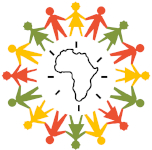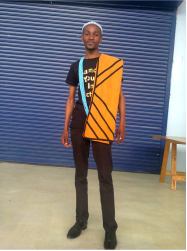The Friends of Thandolwethu Association NPO invite you to participate in a dialogue with the Reggio Emilia Inspired approach to early years learning as we all together hold a community based conversation to think with this question:
What is a Reggio Emilia and Decolonizing Inspired Approach to Early Learning and how appropriate is it in the context of Samora Machel?
Come and join parents, teachers, artists, ECD staff, academics, volunteers,
and students to discuss early years education, Reggio Emilia and decolonised education inspired approaches to early learning.
A workshop with keynote speaker Dr Fikile Nxumalo (PhD) and inclusive education consultant, documentor Joanne Peers (MA in Ed), specialist in professional development for inclusive education Professor Karin Murris (UCT School of Education), philosophical inquiry with children facilitator Rose-Anne Reynolds (PhD candidate), and international puppeteer Siphelo Mtshetsha in Samora Machel.
The workshop will be run in the spirit of a situated dialogue with Reggio Emilia Inspired Practice that acknowledges community-based pedagogical inspirations.
This ECD initiative of residents in Samora Machel, Philippi, Cape Town will include opportunities for engaging with materials. Participants are encouraged to contribute natural and recyclable materials (eg. shells, stones, pieces of string, plastic bottle lids, fabric pieces, cardboard boxes, shiny bits of paper, ribbons, buttons, rope, wire…) and documentation of their work with children eg. write-ups/ posters/photographs/stories (without faces of children please).
Find out more on: www.friendsofthandolwethu.org
RSVP: Nokubonga Mepeni mboyimepeni@gmail.com (078 260 6029) Catherine Colliwood catherinecollingwood@friendsofthandolwethu.org (063 035 8359)
Programme:
09h30 – Arrival and registration
10h00
Official Welcome
Mzikayise Ndzuzo and Nokubonga Mepeni, promoters of a Reggio Emilia inspired ECD project in Samora Machel
Opening
Emanuele Pollio – Consul of Italy in Cape Town
Introductions
Annalisa Contrafatto – chair of Friends of Thandolwethu Association NPO Catherine Collingwood – deputy chair of Friends of Thandolwethu Association NPO
10h20
Opening Conversation
Facilitator: Dr Fikile Nxumalo.
In small groups, participants will share views on how learning happens in Samora Machel, what is the community’s role in learning, and what is quality education in Samora Machel, with the goal to put this conversation in relation with the key elements and values of the Reggio Emilia approach. The main points of the group conversations will be shared with all the participants.
11h00 – Response to the opening conversation
11h15 – Dr Fikile Nxumalo will offer an overview and history of the Reggio Emilia Approach and present some of Loris Malaguzzi’s ideas: the child, curriculum, inquiry, educators, parents and community in the Reggio Emilia approach, exploring the resonances with the content of the opening conversation. Introducing decolonial Early Childhood Development perspectives, she will discuss learning in and with place and context and the possibilities of thinking-with, practicing with a Reggio Emilia inspired approach in Samora Machel. Specific attention will be given to the 100 languages of children and what are the situated languages of children in Samora Machel and to the practice of thinking with place.
12h00 – 12h45 – LUNCH and opportunity to informally engage with materials and documentation of their work with children eg. write-ups/posters/photographs/stories (without faces of children please).
12h45 – Parallel activity sessions: adults and children
Adults session
Fikile Nxumalo and Joanne Peers will facilitate an activity with adults to explore: What does ‘thinking-with place’ mean with regard to decolonial, place based, inquiry-based learning in Early Childhood Education? What might a decolonial place-based early childhood curriculum look like in this particular context?
Children’s session
Rose-Anne Reynolds, assisted by Ubuntubethu volunteers will facilitate an activity with 15 children from 3-7 years old who already attend child-focused activities to hear children’s perspectives on what it is to be a child/ learner in Samora Machel. Siphelo Mtshetsha will offer puppet making knowledge and skill as a language in support of the children expressing their views. Karin Murris will document how the children encounter and engage with the CWD space and the materials
14h00 – Feedback and sharing of experiences from the previous activities. 14h40 – BREAK (tea/coffee/juice)
15h00 – Questions/discussion and creation of a manifesto of sorts that articulates: image of child, image of educator, emergent curriculum, etc. within the particular context of Samora Machel
15h40 – Evaluation
Participants will evaluate the workshop together and propose ideas for future learning gatherings
15h55 -16h00 – Closing
Dr Fikile Nxumalo
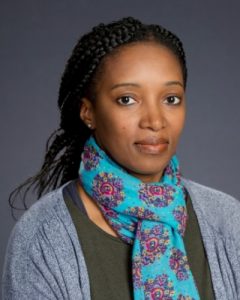 Dr. Fikile Nxumalo is an Assistant Professor of Early Childhood Education in the Department of Curriculum and Instruction in the College of Education at the University of Texas at Austin where she is also affiliated faculty in the Department of African and African Diaspora Studies and the Native American and Indigenous Studies Program. Her scholarship focuses on decolonial approaches to environmental education.
Dr. Fikile Nxumalo is an Assistant Professor of Early Childhood Education in the Department of Curriculum and Instruction in the College of Education at the University of Texas at Austin where she is also affiliated faculty in the Department of African and African Diaspora Studies and the Native American and Indigenous Studies Program. Her scholarship focuses on decolonial approaches to environmental education.
Drawing from her extensive experience as a pedagogical facilitator (pedagogista) in early learning settings, Fikile is also interested in participatory and action-oriented research approaches with in-service early childhood educators. Fikile is passionate about inquiry-based curriculum in early childhood education, which is the focus of her co-authored book Journeys: Reconceptualizing early childhood practices through pedagogical narration (University of Toronto Press, 2014). Her book, Decolonizing Place in Early Childhood Education (Routledge, 2019) examines the entanglements of place, environmental education, childhood, race, and settler colonialism in early
learning contexts in British Columbia, Canada.
“In this groundbreaking work, Dr. Fikile Nxumalo invites critical thinkers, educators, and activists into a series of unsettling pedagogies of resistance and geographies of radical kinship. Dr. Nxumalo asks us to reimagine the practices of early childhood education, and environmental education in historically contextualized, politically demystified, and ethically-reflexive ways. Through interrogations of anthropogenic, anti-Black and settler colonial complicities in early childhood education, Dr. Nxumalo opens up new possibilities for ethical living and learning– a radically relational kinship with all of our relations. Situated in a compelling critical analysis of environmental degradation, precariousness, and exploitation, Dr. Nxumalo offers a timely intervention in the field of education. In contrast to preoccupation with psychocentric notions of complex trauma and damage-centered narratives of childhood, Dr. Nxumalo calls educators to take seriously the structural materiality of violence and alterities to it. To chart these unknown futures, Dr. Nxumalo brilliantly theorizes with Black, Indigenous, post-humanist, and feminist studies; and invites us to consider refiguring presence, witnessing, friction, and the super-complexity of ethical entanglements with one another and more-than-human life. This book is nothing short of strong medicine–to affirm Black and Indigenous life, futures and freedoms; and to call us to action towards different ways of being and doing with, and of land, water, and more than human life. This book should be required reading in studies in education, not only for its incredible theoretical contribution, but for the ways it will enliven radical imagination and movements of resistance.” – Jeffrey P. Ansloos (Fisher River Cree Nation) Assistant Professor of Indigenous Mental Health and Education, University of Toronto–Ontario Institute for Studies in Education.
She can be reached at fnxumalo@austin.utexas.edu
Karin Murris
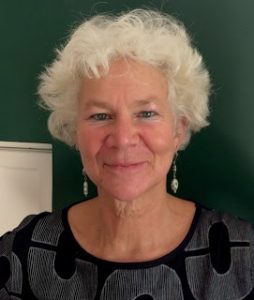 Karin Murris is professor at the School of Education, University of Cape Town (South Africa), where she convened the 16th ICPIC Conference in 2013. She holds a PhD in Philosophy with Children, having been trained in the US by the founder of P4C, the late Matthew Lipman. She is a past president of ICPIC, leads the Southern African P4C network and is the principal investigator of the Decolonising Early Childhood Discourses: Critical Posthumanism in Higher Education research project funded by the South African National Research Foundation (NRF) based at the University of Cape Town, South Africa. She is the author of Teaching Philosophy with Picture Books (1992), The Posthuman Child: Educational Transformation through Philosophy with Picturebooks (2016), and (with Joanna Haynes) Literacies, Literature and Learning: Reading Classroom Differently (2018), Storywise: Thinking through Stories (2002) and Picturebooks, Pedagogy and Philosophy (2012). She is co-editor of the Routledge International Handbook on Philosophy for Children (2017). To find out more about Karin, her articles can be downloaded from https://uct.academia.edu/KarinMurris.
Karin Murris is professor at the School of Education, University of Cape Town (South Africa), where she convened the 16th ICPIC Conference in 2013. She holds a PhD in Philosophy with Children, having been trained in the US by the founder of P4C, the late Matthew Lipman. She is a past president of ICPIC, leads the Southern African P4C network and is the principal investigator of the Decolonising Early Childhood Discourses: Critical Posthumanism in Higher Education research project funded by the South African National Research Foundation (NRF) based at the University of Cape Town, South Africa. She is the author of Teaching Philosophy with Picture Books (1992), The Posthuman Child: Educational Transformation through Philosophy with Picturebooks (2016), and (with Joanna Haynes) Literacies, Literature and Learning: Reading Classroom Differently (2018), Storywise: Thinking through Stories (2002) and Picturebooks, Pedagogy and Philosophy (2012). She is co-editor of the Routledge International Handbook on Philosophy for Children (2017). To find out more about Karin, her articles can be downloaded from https://uct.academia.edu/KarinMurris.
Joanne Peers
 Joanne Peers (MA in Education, University of Cape Town). Joanne is an Early Years education consultant experienced in inclusive education, educator development and curriculum development. She works as the National Curriculum Studies lecturer at The Centre for Creative Education with BEd Foundation Phase and Intermediate Phase student teachers. Additionally, she works at Pinelands North Primary school as Community Support Co-ordinator which continues to add practice based values to her work in education and research. Joanne is a co- researcher in the project ‘Decolonising Early Childhood Discourses’ and has presented at Cape Town conferences on inquiry based pedagogy. She has a special interest in conversations that disrupt habitual ways of thinking about child
Joanne Peers (MA in Education, University of Cape Town). Joanne is an Early Years education consultant experienced in inclusive education, educator development and curriculum development. She works as the National Curriculum Studies lecturer at The Centre for Creative Education with BEd Foundation Phase and Intermediate Phase student teachers. Additionally, she works at Pinelands North Primary school as Community Support Co-ordinator which continues to add practice based values to her work in education and research. Joanne is a co- researcher in the project ‘Decolonising Early Childhood Discourses’ and has presented at Cape Town conferences on inquiry based pedagogy. She has a special interest in conversations that disrupt habitual ways of thinking about child
and childhood, including disrupting the definitive notion of quality education. Publications: Murris, K., Reynolds, R. & Peers, J. (2018) Reggio Emilia inspired philosophical teacher education in the Anthropocene: Posthuman child and the family (tree). In Journal of Childhood Studies: Interdisciplinary Dialogues in Early Childhood Environmental Education Special Issue, 43 (1): 15-29. Reynolds, R. with Peers, J. (2018) ‘Chairs and questions at work in literacies’. Joanne can be reached at joannepeers@gmail.com
Rose-Anne Reynolds
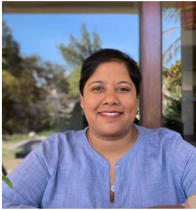 Rose-Anne Reynolds is an Early Childhood Education lecturer and doctoral student in the School of Education at the University of Cape Town. Rose-Anne’s research interests include Philosophy with Children, the Philosophy of Child and Childhood and Inclusive Education including Disability Studies. Since 2016, Rose- Anne has presented her PhD research at conferences in Cape Town, South Africa; Madrid, Spain; Odense, Denmark and was invited as a keynote speaker at a Childhood and Philosophy conference in Rio, Brazil. Rose-Anne is a member of the Decolonising Early Childhood Discourses, NRF project. Rose-Anne is lead author of a chapter in a Routledge book called Literacies, Literature and Learning: Reading Classrooms Differently (2018) and is co-author of an article in the Journal of Childhood Studies (2018).
Rose-Anne Reynolds is an Early Childhood Education lecturer and doctoral student in the School of Education at the University of Cape Town. Rose-Anne’s research interests include Philosophy with Children, the Philosophy of Child and Childhood and Inclusive Education including Disability Studies. Since 2016, Rose- Anne has presented her PhD research at conferences in Cape Town, South Africa; Madrid, Spain; Odense, Denmark and was invited as a keynote speaker at a Childhood and Philosophy conference in Rio, Brazil. Rose-Anne is a member of the Decolonising Early Childhood Discourses, NRF project. Rose-Anne is lead author of a chapter in a Routledge book called Literacies, Literature and Learning: Reading Classrooms Differently (2018) and is co-author of an article in the Journal of Childhood Studies (2018).
Rose-Anne can be reached at rose-anne.reynolds@uct.ac.za
Siphelo Mtshetsha
Siphelo Mtshetsha is an actor and puppeteer who believes in the potential of the creative arts for youth development. He is the Director of Internships at The Fugard Theatre, Cape Town and manages the Siphesakhe Youth Organization based in Samora Machel. In 2018 SYO won Best Ensemble at the Zabalaza Theatre Festival. Siphelo recently returned from performing in the UK. He can be contacted at smtshetsha@gmail.com
